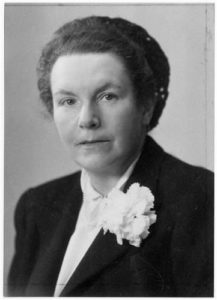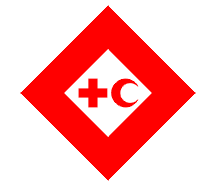
Renée-Marguerite Frick-Cramer[i] was born on the 28th of December 1887 in Geneva and deceased on the 22nd of October 1963 in the same city, Renée-Marguerite Cramer started her career as a historian before becoming the first woman delegate and member of the International Committee of the Red Cross (ICRC). Daughter of Eugénie Léonie Micheli and of Louis Cramer, steward and member of the consistory, she grew up in a family of the Geneva bourgeoisie. As such, several members of her family, both close and distant, sat as members in ICRC at the same time as she did.
Having graduated with a law degree from the University of Geneva in 1910 and then after obtaining a doctorate in literature, Renée-Marguerite Cramer specialised herself in the history of the Swiss Confederation and for a while went on to undertake university research. She was awarded the Ador Prize for History both in 1911 and in 1913. A prize given out for the quality of her works on Geneva’s political and diplomatic relations in the 19th century. The titles of which translate from the original French to “The political relations of Geneva and of the Swiss during the 18th century” and “The diplomatic relations of Geneva from 1814 to 1816”. In 1914, she published her most known work, Genève et les Suisses or “Geneva and the Swiss”, during the centennial of the attachment of the city to the confederation. Four years later, she became the substitute professor of national history at the university of Geneva.
During the First World War, Renée-Marguerite Cramer became somewhat closer to the ICRC: she participated in the creation of the International Prisoners of War Agency of Geneva and presided over the branch dedicated to the Agreement’s prisoners alongside Jacques Chenevière. In 1918, after a first semester of teaching at the university, wherein she was supposed to replace the historian Charles Bourgeaud, she became the first woman to become a member of the directing committee of the ICRC, the entry of which is done by co-optation. She thus became closer to the path of her maternal grandfather, who was one of the first members of the institution. In 1920, she married Édouard Frick, who was General Delegate of the ICRC for Oriental Europe.
Throughout the duration of her function from 1918 to 1946, Renée-Marguerite Cramer participated in the drafting of the Convention of 1929 relative to the Treatment of Prisoners of War as well as the Tokyo Project of 1934. The latter was never completed, despite its ambition to protect civilians of enemy nationality in times of war. More specifically, during Second World War, Renée-Marguerite Cramer campaigned in favour for an intervention against the deportations committed by Nazi Germany. To do so, she urged the presidents of the ICRC, Max Huber and Carl J. Burckhardt to launch an appeal by the institution on this subject and to send an emissary to Berlin to discuss the fate of political prisoners. However, her proposition was rejected by an important section of the committee. In 1946, Renée-Marguerite Cramer eventually resigned from the ICRC, although she was named an honorary member for the rest of her life. She died on the 22nd of October 1963 in Geneva.
(CM)
- Palmieri, Daniel, « Marguerite Frick-Cramer » in Ziegler Deuber, Erica, Tikhonov, Natalia, Les Femmes dans la mémoire de Genève, Genève, Éditions Susan Hurter, 2005, pp. 182-183.
- Pavillon, Monique, « Les femmes suisses face à la Deuxième Duerre mondiale », in Matériaux pour l’histoire de notre temps, 2009, n° 93, pp. 49-59.
- « Prix Ador, Prix Disier, Prix Hentsch, Prix Humbert, Prix universitaires et Prix universitaires non décernés. 1870-1992 », in CH BGE 1-127, Catalogue des manuscrits, Bibliothèque de Genève.
- Rossi, Frédéric, Vuilleumier, Christophe, Quel est le salaud qui m’a poussé ? Cent figures de l’histoire suisse, Gollion, Infolio, 2016.
- Vonèche, Cardia, « Les raisons du silence du comité international de la Croix-Rouge (CICR) face aux déportations », in Revue d’Histoire de la Shoah, n° 203, 2015, pp. 87-122.
–+–
[i] This entry has been taken, in its entirety, from a website which is dedicated to document streets in Geneva named for women, 100elles.ch, which contains the entry: https://100elles.ch/en/100femmes/marguerite-frick-cramer/
